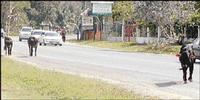
Denise Clarke, Staff Reporter
WESTERN BUREAU:
It was a little after 10 o'clock in the morning. Twenty-six of them, accused of wreaking havoc on public roads, were sprawled across an open field waiting to be sold. It is hard to believe that so many cows were picked up off the streets, where they had been posing a great threat to motorists. The animals were impounded on the streets of Trelawny and St. James by Western Parks and Markets. The owners were given 15 days within which to claim the impounded animal. Not one of them did. So now the time has expired, and the animals are now on the auction block.
This is where most impounded animals end up. Due to the decreased value of beef, the owners are not too keen to re-claim them. The cost to re-claim a cow from the pound ranges from $1,000 to $3,000 depending on the size of the animal.
Today, the choice is varied, from fat, healthy-looking ones, to skinny rib-showing ones. There are eight bulls, 11 heifers and seven calves.
This time, the auctioneer is doing things a little differently today. The cows are plenty, so he is allowing the buyers to make their pick and then bargain a price.
"As soon as you see the one you want, take him out of the lot," yelled the auctioneer, Wembley Williams. "I am selling everything today... you have to mix them, mix them," he warned.
As someone who has been in the business for some time, Mr. Williams knows that the auction will not be a success if he does not pair the bulls with the heifers. Bulls are always in high demand, but heifers can be a hard sell, as their meat is thought to be inferior. Butcher Dalton Watt believes this to be true. He purchased four cows, two bulls and two heifers. If he had his way, however, it would be four bulls instead of two.
"They have better beef," he said. "I would have four bulls if it was my choice."
The calves are also proving hard to sell. The auctioneer insisted that the calves and the mother will be sold together.
"Buy a small cow with the calf," said Mr. Williams, attempting to convince a female buyer who had shown interest in one of the calves.
"I can't afford the mother," she responded. "And besides, I don't have the space for the two of them."
Nevertheless, the day proves to be a good one, and in the end all 26 cows are sold - and at bargain prices too. It is not always a success. When an auction is advertised, prospective buyers usually visit the pound beforehand to inspect the animals. If they don't like what they see, they will not return for the auction.
The pound does not try to make a profit, Mr. Williams said, but rather to recover the costs of impounding the animals. Bargaining usually starts at the pound fee, all the more reason why butchers like Mr. Watt prefer to buy from the pound. The puond fee is usually the cost to feed the cows.
"We get the best price here, it's reasonable. The price of cows is down generally so I come here where I can get a better price," he said.
Beef sells for $30-$40 a pound at the meat shops. That is the same price the iron-rich meat has fetched the past three or so years, although the cost of chicken and other meats have risen dramatically. Widespread publicity on the Bovine Spongiform Encephalo-pathy (BSE) or Mad Cow disease which broke out among cattle in Europe in 1996 is mostly blamed for the plunge the industry has taken. Since cows are seen as having little value, farmers now have little interest in rearing them, and as a result the cows are often left to roam public streets. These animals are now blamed for a large number of traffic accidents, prompting the Government to revisit the Pound Act, in and effort to control these stray animals more effectively.
The proposed amendments include giving the meat of the impounded animals to prisons and other public institutions.
In meantime, cows as well as dogs and other stray animals are still on the nation's streets.

















